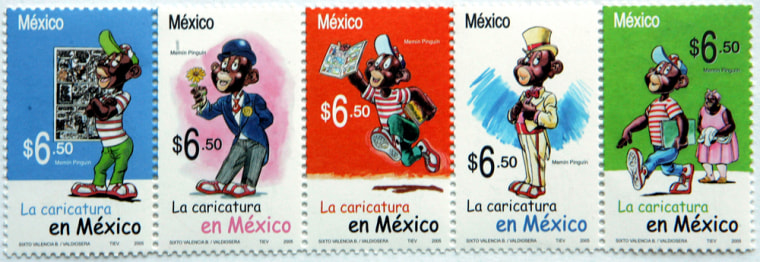The White House on Thursday objected to a postage stamp issued by the Mexican government, saying that “racial stereotypes are offensive no matter what their origin” and have no place in today’s world.
The stamp depicts an exaggerated black cartoon character known as Memin Pinguin, drawn with exaggerated features, thick lips and wide-open eyes. His appearance, speech and mannerisms are the subject of kidding by white characters in the comic book, which started in the 1940s and is still published in Mexico.
White House press secretary Scott McClellan said it was “an internal issue for Mexico and the postal authorities that issued the stamp. With that said, I would like to make a couple of points. Racial stereotypes are offensive no matter what their origin. The Mexican government needs to take this into account. Images like these have no place in today’s world.”
Mexico said that like Speedy Gonzalez — a cartoon mouse with a Mexican accent that debuted in the United States in 1953 — the Memin Pinguin character shouldn’t be interpreted as a racial slur.
Activists have also called on the Mexican government to withdraw the stamp.
“One would hope the Mexican government would be a little more careful and avoid continually opening wounds,” said Sergio Penalosa, an activist in Mexico’s small black community on the southern Pacific coast.
“But we’ve learned to expect anything from this government, just anything,” Penalosa said.
Fox’s comments
The stamp was issued just weeks after remarks by President Vicente Fox angered black Americans.
In May, Fox riled many by saying Mexican migrants take jobs in the United States that “not even blacks” want. Fox later expressed regret for any offense the remarks may have caused, but insisted his comments had been misinterpreted.
Carlos Caballero, assistant marketing director for the Mexican Postal Service, said the new stamps are not offensive, nor were they intended to be.
“This is a traditional character that reflects part of Mexico’s culture,” Caballero said. “His mischievous nature is part of that character.”
However, Penalosa said many Mexicans still assume all blacks are foreigners, despite the fact that at one point early in the Spanish colonial era, Africans outnumbered Spanish in Mexico.
‘It's from another era’
“At this point in time, it was probably pretty insensitive” to issue the stamps, said Elisa Velazquez, an anthropologist who studies Mexico’s black communities for the National Institute of Anthropology and History.
“This character is a classic, but it’s from another era,” Velazquez said. “It’s a stereotype, and you don’t want to encourage ignorance or prejudices.”
The 6.50-peso (60 cent) stamps — depicting the character in five poses — was issued with the domestic market in mind, but Caballero noted they could be used in international postage as well. A total of 750,000 of the stamps will be issued.
Ben Vinson, a black professor of Latin American history at Penn State University, said he has been called “Memin Pinguin” by some people in Mexico. He said the character’s mother is drawn to look like an old version of the U.S. advertising character Aunt Jemima.
The stamps are part of a series that pays tribute to Mexican comic books. Memin Pinguin, the second in the series, was apparently chosen for this year’s release because it is the 50th anniversary of the company that publishes the comic.
Publisher Manelick de la Parra told the government news agency Notimex the character would be a sort of goodwill ambassador on Mexican letters and postcards. “It seems nice if Memin can travel all over the world, spreading good news,” de la Parra said, calling him “so charming, so affectionate, so wonderful, generous and friendly.”
